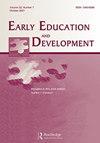早期护理和教育劳动力补偿,项目质量和儿童结局:研究综述
IF 2.2
3区 教育学
Q1 EDUCATION & EDUCATIONAL RESEARCH
引用次数: 0
摘要
摘要研究发现:尽管早期护理和教育(ECE)对儿童的早期学习和父母的劳动力参与具有重要意义,但工人平均工资低,福利少。工作的不稳定和低报酬会造成工作人员的流动和其他问题,对工作人员的福利、儿童的发展和父母的就业都有潜在的影响。2019冠状病毒病大流行加剧了欧洲经委会人员供应和工作人员征聘和留用方面的问题。本文提供了一个简单的背景,然后回顾了早期ECE工人薪酬与项目质量、儿童成果和员工流动率之间的实证研究。我们确定了一系列研究,检查了欧洲经委会的工资或工作场所福利,其中大多数使用非实验方法。一般来说,大多数研究发现,低薪酬、员工心理健康或幸福感差、离职或打算离开工作岗位或幼儿领域之间存在很小的关联。很少有研究调查了薪酬与质量衡量或儿童结局之间的关系,发现了很小或不显著的联系。一项采用实验方法的研究发现,有证据表明,奖金可以降低员工流动率。实践或政策:总之,证据表明,在欧洲经委会,低工人报酬与较差的工人成果和员工流动率有关。披露声明作者未报告潜在的利益冲突。参见:https://eclkc.ohs.acf.hhs.gov/policy/45 - cfr -章- xiii/1302 - 91 -人员- -能力- requirements.2资格。2 .劳动所得税抵免(EITC)、医疗补助或儿童健康保险计划(CHIP)、补充营养援助计划(SNAP)或贫困家庭临时援助(TANF)。在《军事儿童保育法》之前和之后,军事中心的教师也有资格享受福利,包括健康和牙科保险,带薪病假和年假,以及退休计划。欲了解更多信息,请访问:https://osse.dc.gov/ecepayequity.5。欲了解更多信息,请访问:https://sfmayor.org/article/mayor-breed-announces-landmark-pay-raise-initiative-early-educators-city-funded-programs.6。欲了解更多信息,请参阅https://ballotpedia.org/New_Mexico_Constitutional_Amendment_1,_Land_Grant_Permanent_Fund_Distribution_for_Early_Childhood_Education_Amendment_(2022).Additional信息基金作者感谢巴纳姆家庭基金会和DC儿童行动的支持。本文章由计算机程序翻译,如有差异,请以英文原文为准。
Early Care and Education Workforce Compensation, Program Quality, and Child Outcomes: A Review of the Research
ABSTRACTResearch Findings: Despite the importance of early care and education (ECE) for children’s early learning and parents’ labor force participation, workers average low pay with few benefits. The precarity of work and low compensation contribute to staff turnover and other problems, with potential implications for staff well-being, children’s development, and parents’ employment. The COVID-19 pandemic exacerbated problems relating to the supply of and staff recruitment and retention in ECE. This paper provides a brief background and then reviews the empirical research linking early ECE worker compensation with program quality, children’s outcomes, and staff turnover. We identified a range of studies that examined pay or workplace benefits in ECE, the majority of which used nonexperimental methods. In general, most studies found small associations among low compensation, poor worker mental health or well-being, or turnover or intentions to leave their jobs or the early childhood field. Fewer studies examined associations between compensation and measures of quality or children’s outcomes, finding small or nonsignificant associations. One study using experimental methods found evidence that financial bonuses reduced staff turnover. Practice or Policy: Together, evidence suggests that low worker compensation is linked with poorer worker outcomes and staff turnover in ECE. Disclosure StatementNo potential conflict of interest was reported by the author(s).Notes1. See: https://eclkc.ohs.acf.hhs.gov/policy/45-cfr-chap-xiii/1302–91-staff-qualifications-competency-requirements.2. The Earned Income Tax Credit (EITC), Medicaid or the Children’s Health Insurance Program (CHIP), the Supplemental Nutrition Assistance Program (SNAP), or Temporary Assistance for Needy Families (TANF).3. Both before and after the Military Child Care Act, teachers at military centers were also eligible for benefits, including health and dental insurance, paid sick and annual leave, and a retirement plan.4. For more information, see: https://osse.dc.gov/ecepayequity.5. For more information, see: https://sfmayor.org/article/mayor-breed-announces-landmark-pay-raise-initiative-early-educators-city-funded-programs.6. For more information, see https://ballotpedia.org/New_Mexico_Constitutional_Amendment_1,_Land_Grant_Permanent_Fund_Distribution_for_Early_Childhood_Education_Amendment_(2022).Additional informationFundingThe authors are grateful for support from the Bainum Family Foundation and DC Action for Children.
求助全文
通过发布文献求助,成功后即可免费获取论文全文。
去求助
来源期刊

Early Education and Development
Multiple-
CiteScore
5.50
自引率
10.30%
发文量
78
期刊介绍:
Early Education and Development (EE&D) is a professional journal for those involved in educational and preschool services and research related to children and their families: early education supervisors, school psychologists, daycare administrators, child development specialists, developmental and child clinical psychologists, and special education administrators. It is designed to emphasize the implications for practice of research and solid scientific information. The age range focused upon is preschool through the primary grades. EE&D is a connecting link between the research community in early education and child development and school district early education programs, daycare systems, and special needs preschool programs.
 求助内容:
求助内容: 应助结果提醒方式:
应助结果提醒方式:


